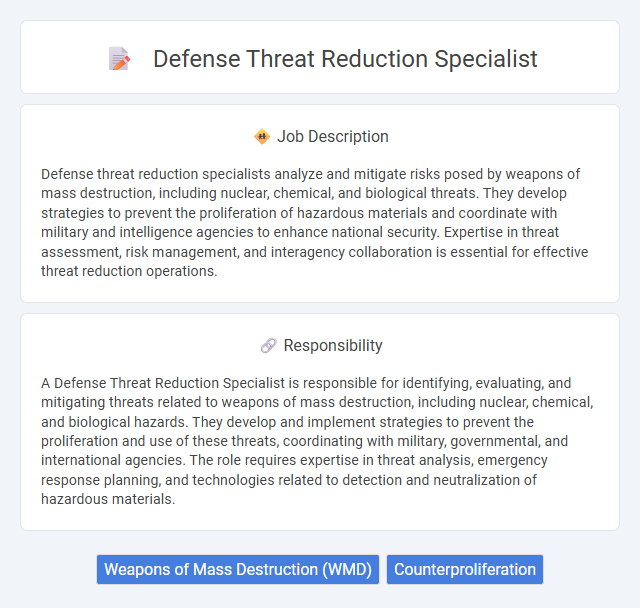
Defense threat reduction specialists analyze and mitigate risks posed by weapons of mass destruction, including nuclear, chemical, and biological threats. They develop strategies to prevent the proliferation of hazardous materials and coordinate with military and intelligence agencies to enhance national security. Expertise in threat assessment, risk management, and interagency collaboration is essential for effective threat reduction operations.
Individuals with strong analytical skills, resilience under pressure, and a commitment to national security are likely to be suitable for a Defense Threat Reduction Specialist role. Those comfortable working in high-stakes environments and capable of managing complex technical information might find this job aligns well with their abilities. People who prefer routine tasks or lack interest in defense-related challenges may be less suited for this position.
Qualification
A Defense Threat Reduction Specialist typically holds a bachelor's degree in fields such as engineering, biology, chemistry, or international relations, with advanced degrees preferred for senior roles. Expertise in weapons of mass destruction (WMD) identification, chemical, biological, radiological, and nuclear (CBRN) defense, and risk assessment methodologies is essential. Relevant certifications, security clearances, and proficiency in threat analysis software enhance job performance and eligibility.
Responsibility
A Defense Threat Reduction Specialist is responsible for identifying, evaluating, and mitigating threats related to weapons of mass destruction, including nuclear, chemical, and biological hazards. They develop and implement strategies to prevent the proliferation and use of these threats, coordinating with military, governmental, and international agencies. The role requires expertise in threat analysis, emergency response planning, and technologies related to detection and neutralization of hazardous materials.
Benefit
A Defense Threat Reduction Specialist position likely offers significant benefits such as enhanced job security due to high demand in national security sectors and opportunities for professional growth through specialized training in countering weapons of mass destruction. Employees probably receive competitive salaries, comprehensive healthcare, and retirement plans reflecting government or defense contractor standards. The role may also provide a unique chance to contribute meaningfully to global safety and stability, which can be highly rewarding on a personal and professional level.
Challenge
A Defense Threat Reduction Specialist likely faces the challenge of constantly adapting to evolving global security threats, requiring advanced knowledge in chemical, biological, radiological, and nuclear (CBRN) defense. The role probably demands high-level analytical skills to assess risks and develop effective countermeasures under pressure. Managing complex coordination between military, government agencies, and international partners might be a persistent and critical challenge in this position.
Career Advancement
Career advancement for a Defense Threat Reduction Specialist involves progressing from entry-level analysis and field operations to senior positions in strategic planning and policy development within government or defense agencies. Specialists gain expertise in weapons detection, hazardous materials, and counter-proliferation tactics, which enhances opportunities for leadership roles and high-level consulting. Advanced certifications and security clearances further accelerate career growth in this critical national security sector.
Key Terms
Weapons of Mass Destruction (WMD)
A Defense Threat Reduction Specialist focuses on mitigating risks associated with Weapons of Mass Destruction (WMD) including nuclear, chemical, and biological weapons. The role involves developing strategies to detect, prevent, and respond to WMD threats to enhance national and global security. Expertise in threat assessment, intelligence analysis, and interagency coordination is critical for effective WMD threat reduction.
Counterproliferation
A Defense Threat Reduction Specialist specializes in counterproliferation strategies to prevent the spread of weapons of mass destruction (WMD) and related materials. They analyze intelligence, develop mitigation plans, and coordinate with international agencies to disrupt illicit trafficking and enhance global security frameworks. Expertise in chemical, biological, radiological, and nuclear (CBRN) threat reduction is critical for effective counterproliferation operations.
 kuljobs.com
kuljobs.com